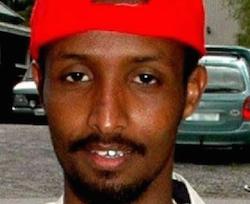[Shabelle] Abdukadir Mohammed Abdukadir, a senior operative from the Somali Islamist group al-Shabaab
... the personification of Somali state failure...
, who was the target of an unsuccessful raid by US special forces last month, travelled to London in 2007, the BBC has learned.
The man, widely known as Ikrima, also applied, unsuccessfully, for asylum in Norway.
He is linked to a number of alleged terror plots in Kenya, one involving Samantha Lewthwaite, the British widow of one of the jacket wallahs who attacked the London transport system in 2005.
The only pictures we have of Ikrima show him as a smiling immigrant in Norway.
Taken, it is thought around 2005, a year after he moved to Scandinavia, he appears happy in his new rural Scandinavian home.
In 2008, he left for Somalia, where he is now thought to be a senior recruiter of imported muscle, and a possible link between al-Shabaab in Somalia and al-Qaeda in the Arabian Peninsula, based in Yemen.
Smoking marijuana
How did this transformation occur?
In Eastleigh, a district of the Kenyan capital Nairobi with a large Somali population, we met "Haji".
Haji is not his real name, he wants to remain anonymous. He is a former al-Shabaab fighter, and he knew Ikrima well.
"He came from Mombasa with his family," he says. "His family were middle class, a very virtuous family."
As teenagers, Haji and Ikrima would hang out together in Eastleigh, smoking marijuana and chewing the stimulant, khat.
In 2004 Ikrima moved to Norway, and the pair lost touch. Four years later, Haji joined al-Shabaab. When he got to Mogadishu, he was surprised to be reunited with his old friend.
"When I met him, I saw that he had changed. We used to play, we used to hug each other, whenever we met, [now] there was nothing like that.
"The guy has changed, totally changed.
"This guy called Ikrima was never on the battle ground, never on the frontline. But the guy was a strategist. He plans. He plans so extreme that, you know, those with him they say: 'Oh, that is too much, Ikrima.'"
'Awakening process'
Haji says Ikrima was aloof, keeping company mainly with al-Shabaab's imported muscle, who he says got preferential treatment in the organization.
He does not know where his former friend was recruited, whether it was in Norway or Somalia, or during a visit to London in early 2007.
Haji's own recruitment began in the same year. A local preacher had gone around Eastleigh targeting young, unemployed men.
"That was the time of the awakening process in Iraq," he says.
"And then all of a sudden [the preacher] had these jihadist videos, [showing] how the Moslems are being killed, being raped.
"He said: 'Now the war is coming to our ancestral lands. It's our obligation to defend it.'
| And the preacher said: 'I'm providing you with wages, allowances, salaries, maybe even if you like, to get married.' |
And he said: 'I'm providing you with wages, allowances, salaries, maybe even if you like, to get married.'"
'Ashamed of my actions'
Haji says the preacher promised him $1,000 (£600) per month. But when he got to Somalia, the money never materialised. He never got paid.
After three years, Haji became disillusioned with life as a jihadi.
He fled al-Shabaab and returned to Kenya. Of 14 young recruits from his neighbourhood, he says that he is the only one who made it back.
Looking back, Haji regrets his time with al-Shabaab.
"What a fool I was. Now I am feeling ashamed of my actions. Why did I waste all that time, when I could do something better in life?"
Ikrima, meanwhile, is thought to be still in Somalia.
Leaked Kenyan intelligence documents have linked him to Ms Lewthwaite, the British widow of Germaine Lindsey, who was one of four suicide bombers who attacked the London transport system on 7 July 2005.
Ikrima and Ms Lewthwaite are said to have conspired, along with a second British suspect, Jermaine Grant, to bomb targets in Kenya. The alleged plot was foiled when Kenyan police nabbed
Maw! They're comin' to get me, Maw!
Mr Grant in Mombasa in December 2011.
Ms Lewthwaite slipped away, but at her home police found a diary containing musings on the life of a jihadi.
"Recently my husband gave a talk to my eight-year-old son and five-year-old daughter," it reads.
"He asked them: What do you want to be when you are older. Both agreed to wanting to be a mujahid [jihadi]," she writes
It is not clear what role, if any, Ikrima or Ms Lewthwaite might have played in the attack on the Westgate shopping mall last month.
Neither is thought to have been inside the building. But the authorities believe apprehending them is key to preventing similar attacks in the future. |
 The hunt for Kenya's most wanted terrorist, Abdukadir Mohammed Abdukadir, alias Ikrima, has gone a notch higher with the US government placing a $9 million (Sh779.4 million) bounty on his head alongside two other men.
The hunt for Kenya's most wanted terrorist, Abdukadir Mohammed Abdukadir, alias Ikrima, has gone a notch higher with the US government placing a $9 million (Sh779.4 million) bounty on his head alongside two other men.
 [BBC.CO.UK] An air strike in southern Somalia has killed two senior commanders of the
[BBC.CO.UK] An air strike in southern Somalia has killed two senior commanders of the